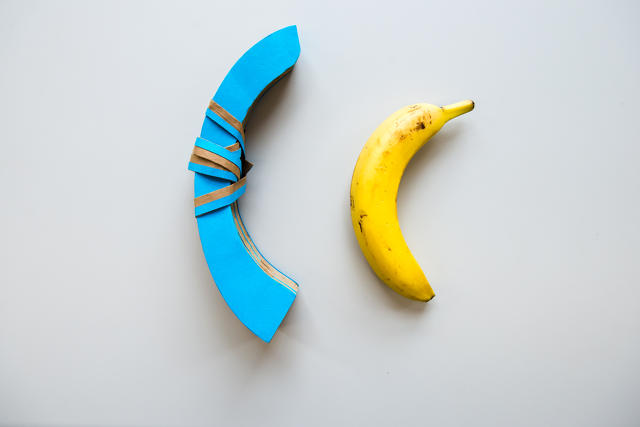The winner of this year's James Dyson Award is a $5 on-the-go safety accessory for bike-share riders. Will it catch on?
Helmets are an inherently unsexy topic, but they're also the most hotly debated. Some doctors say there's no point in wearing them. Others researchers claim they put riders at more risk of collisions. Science has shown that helmets do lower the risk of brain injury. To designer Isis Shiffer, it absolutely makes sense to wear one—always.
Shiffer is a native New Yorker and a frequent cyclist. In the past few years, CitiBike—New York's bike-share program—has flooded the streets with bikes, and she's noticed that most of the riders don't wear helmets. "It's hair-raising," she says.

To tackle the problem of bike-share riders not wearing helmets, Shiffer came about it from a price and availability angle. The product would have to be affordable, readily available, and easy to transport. Enter the EcoHelmet, a $5 design made from paper that folds flat. Since the design debuted earlier this year, it's been somewhat of a media darling. Now, it's the recipient of the James Dyson Award.
"In a perfect world we wouldn't need helmets," Shiffer says acknowledging the larger issue on American streets involving careless drivers. She points out that while American cities are building bike lanes, drivers don't always respect them. "In a way [my helmet] is a Band-Aid solution [to bigger bike safety problems], but if someone wears my helmet and it saves a life, it doesn't matter if it's a Band-Aid solution."
Based on an ultra-strong honeycomb paper structure—imagine paper decorations that unfold to form a 3D object—the helmet absorbs impact to protect a wearer's skull just as effectively as the polystyrene found in traditional alternatives. The product's genius is that it collapses down to the size of a banana—the first hurdle in getting someone to use the design.

"The reason it has to fold up so small is twofold," Shiffer says. "If they are going to be sold from a vending machine—a use case I imagined—a regular-sized vending machine can only hold so many. Secondly, a helmet becomes a liability when you get off the bike. It's a big clunky thing you can't keep with you." Another challenge Shiffer saw was conceiving of a silhouette that people would want to wear. "I'm not sure if you can make a helmet cool," she says. "But you can design it so it's not embarrassing."
Shiffer is currently working with the Los Angeles-based company MemBrain LLC to commercialize her prototype and put it into production. She's still in the early stages and is meeting with manufacturers to see who can make the honeycomb structure in a way that's affordable and durable. MemBrain hopes to pilot the first batch of production helmets in the spring of 2017.
After manufacturing, the next challenge is distribution. Shiffer is in talks with Motivate, the company that runs bike-share programs in Chicago and New York, which has expressed interest in handing them out as a free gift with membership. Shiffer also sees the possibility of a vending machine network or of stocking the helmets at places that have a big retail network, like Walgreens and Starbucks (these are hypothetical examples, as no retail partnership has been made). "I really think it's going to be city specific since the bike-share ecosystems are different," she says.
As a bicycling advocate, Shiffer believes that the more people who ride bikes, the better our cities will be. "Once there are enough cyclists using bikes for a utilitarian reason rather than for sport or leisure, that's when the face of a city improves," she says. "It's intimidating to be on the streets, and giving a sense of safety and confidence is important [to getting more riders out]."
So until American cities solve the grander challenge of building multimodal streetscapes, and until drivers learn how to share the road, Shiffer's EcoHelmet makes for a safer ride—real or perceived—for bike-share users.